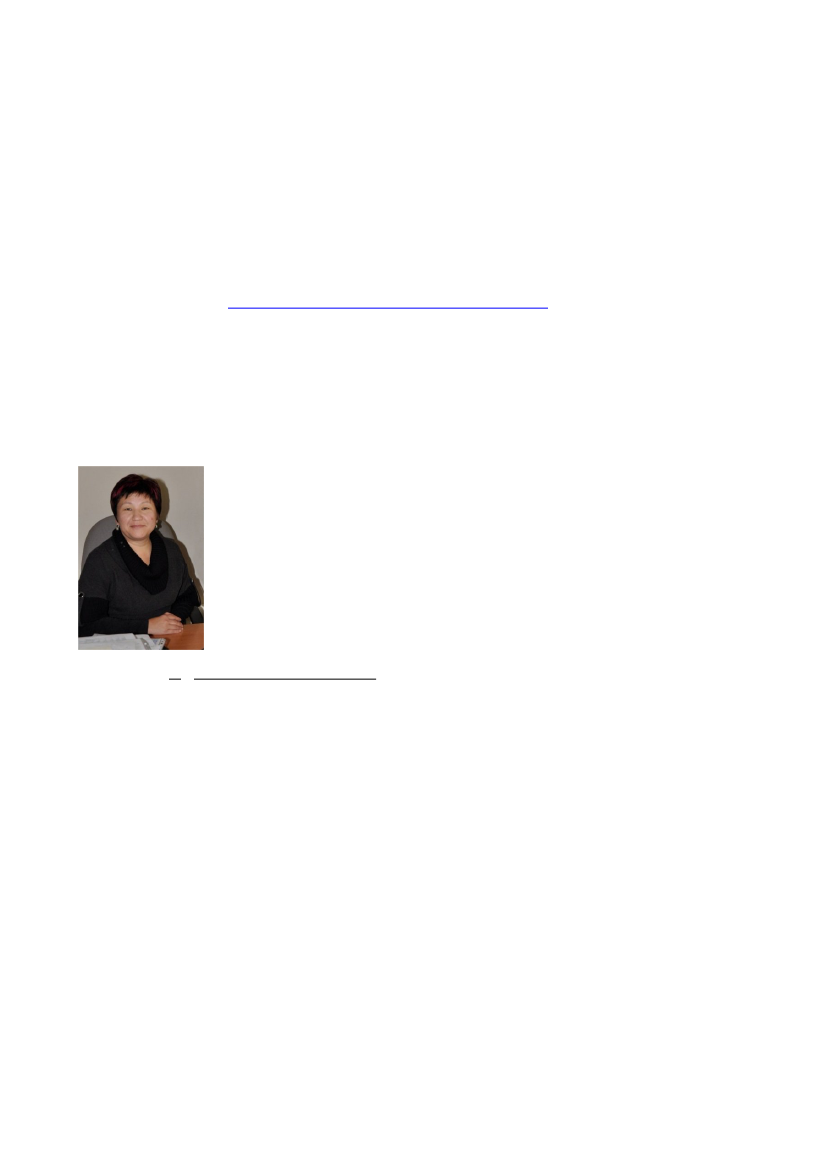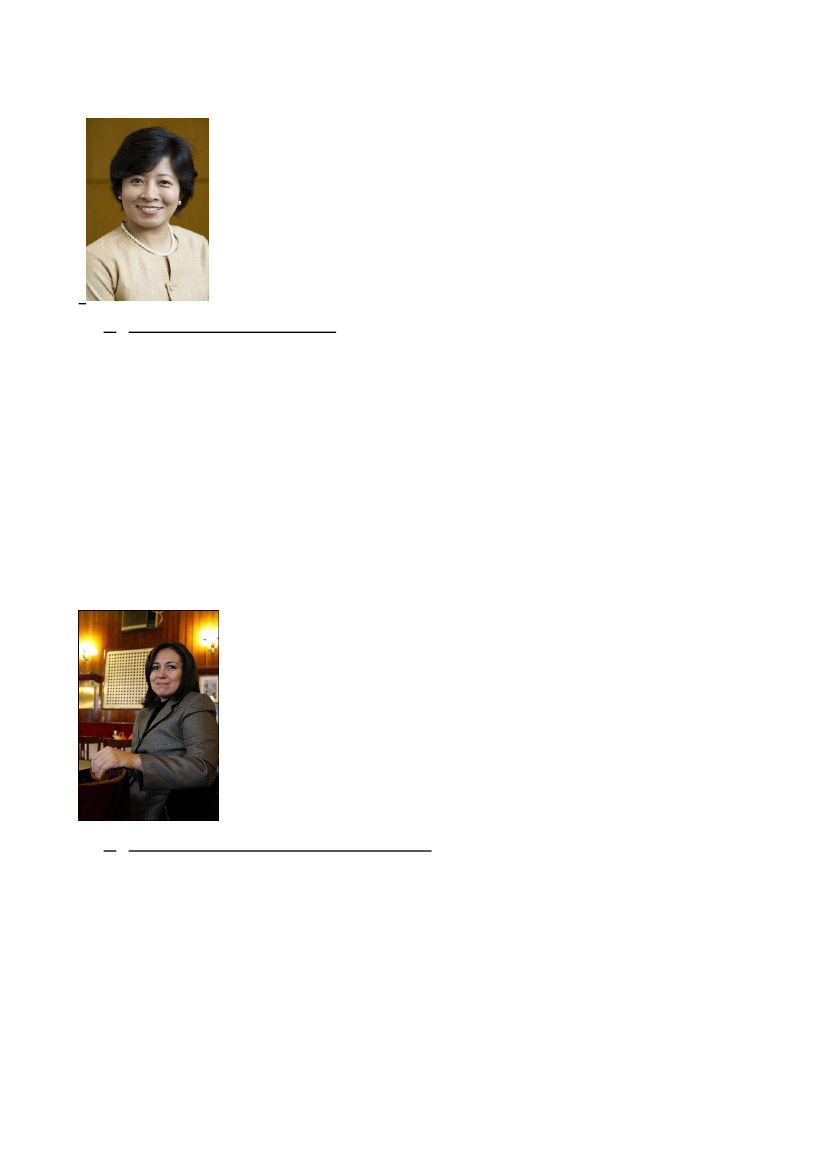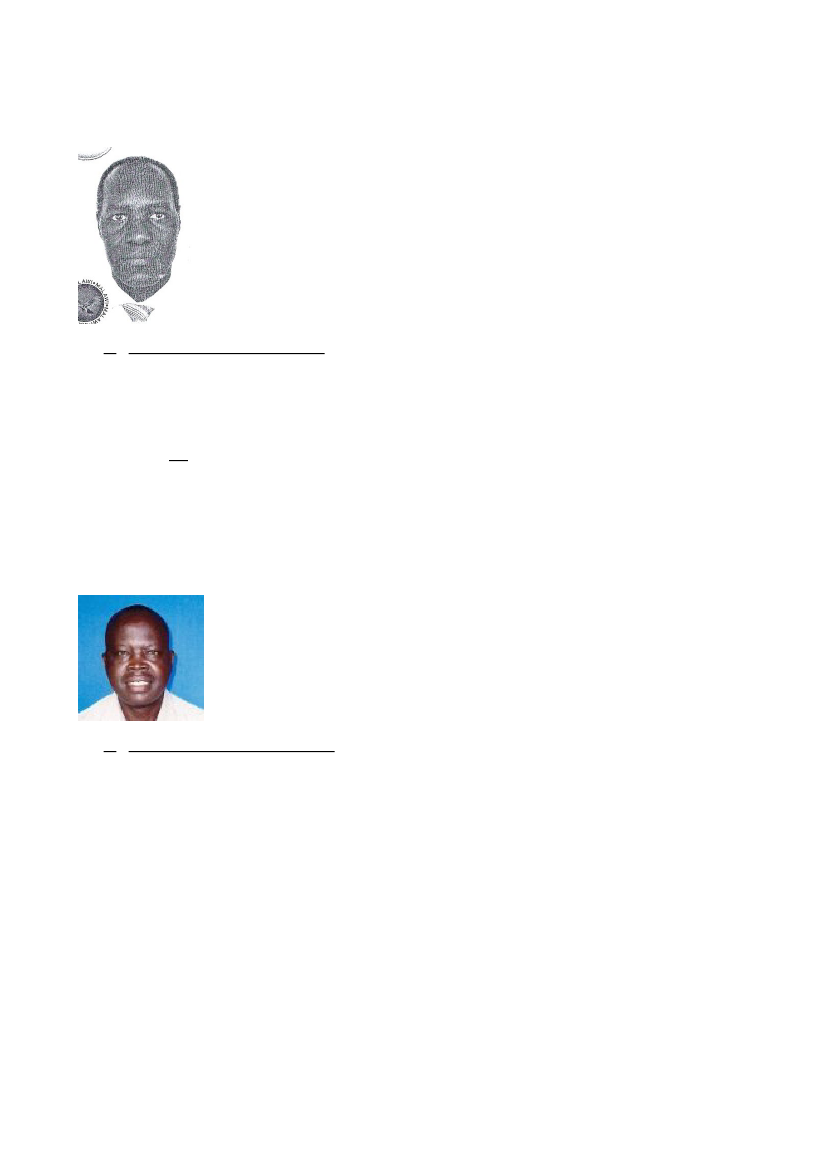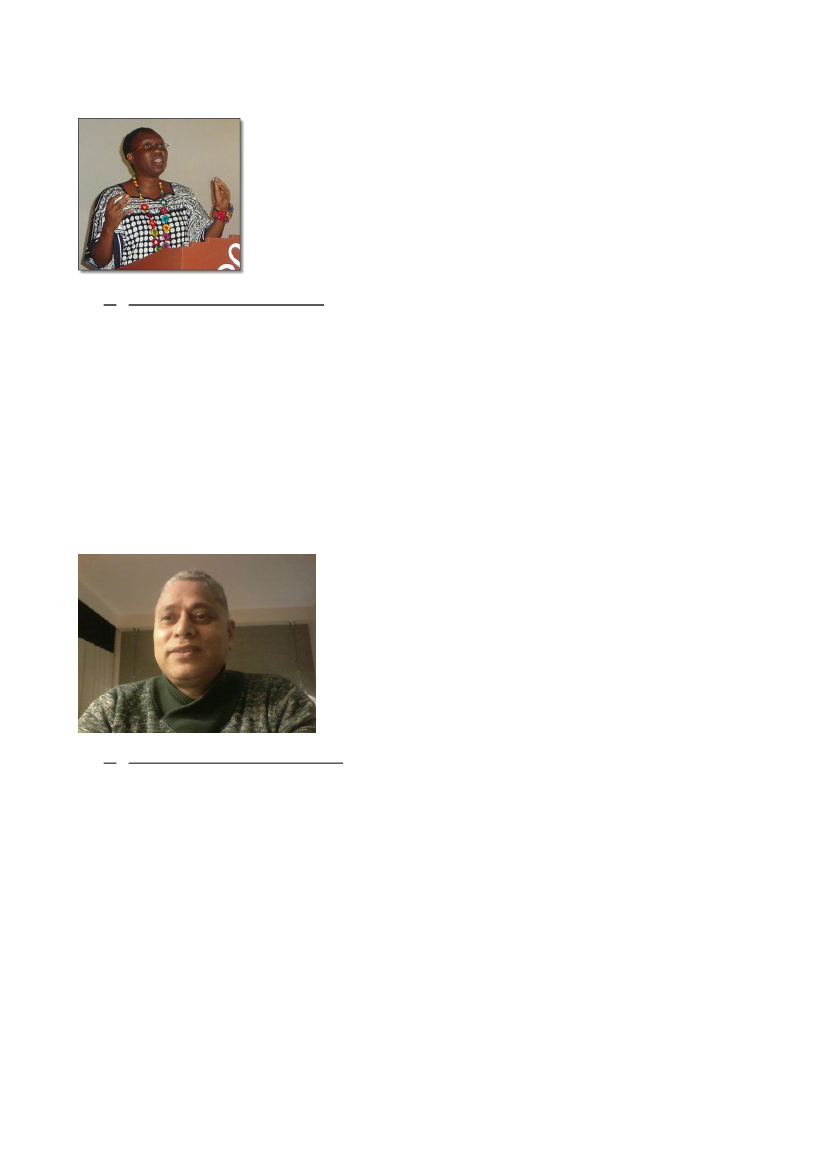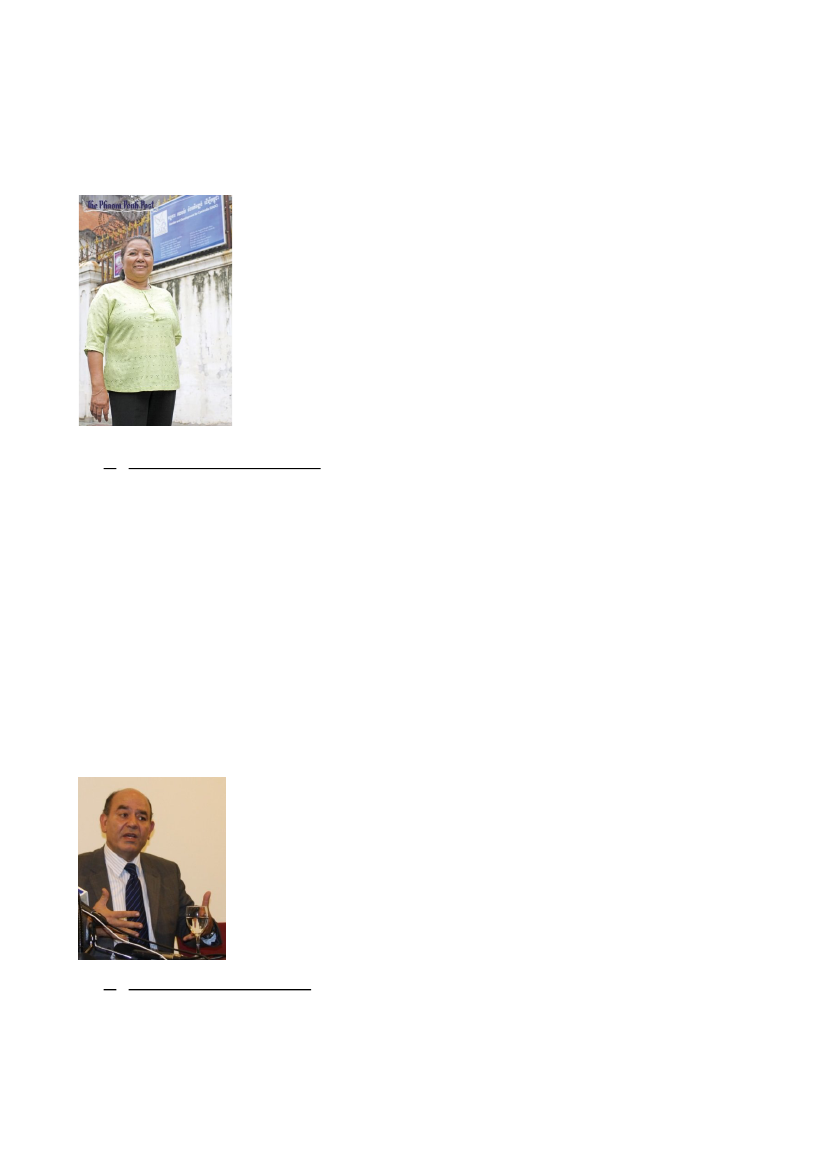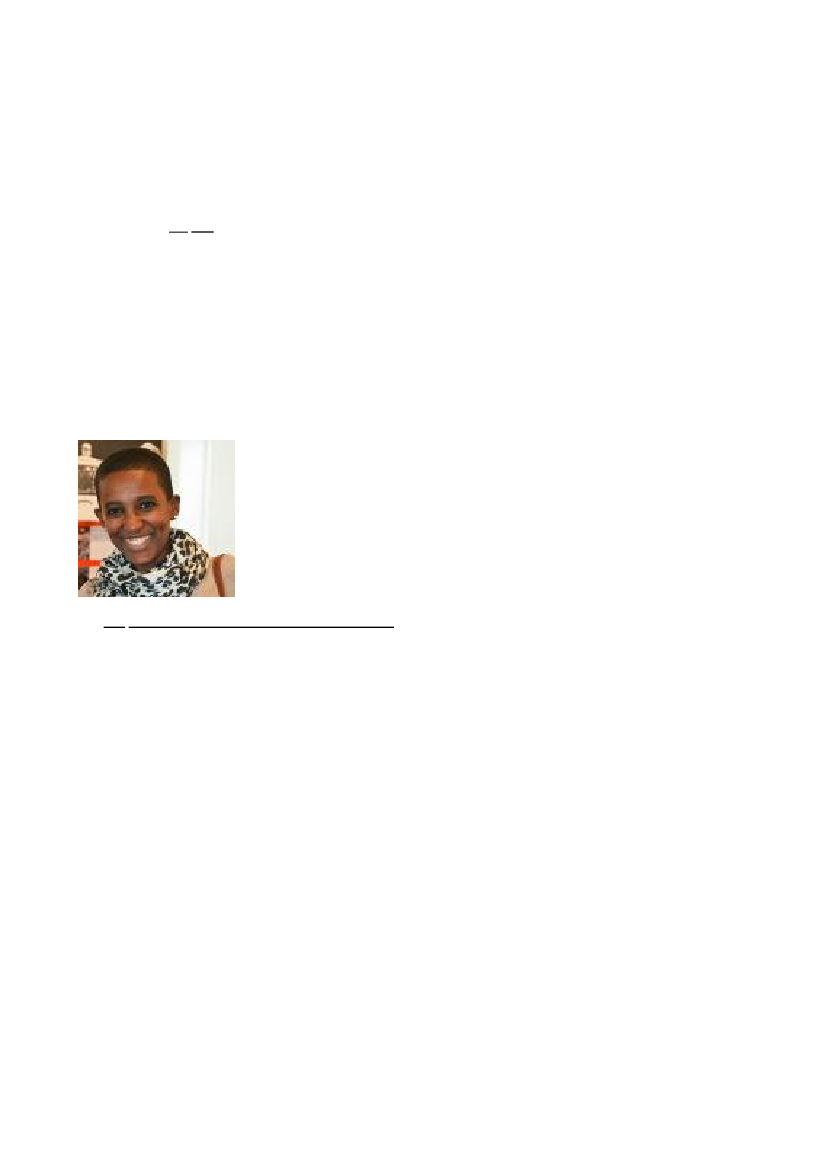Udenrigsudvalget 2013-14
URU Alm.del Bilag 150
Offentligt
Proposals for media exposure of DCA partner group April 2014International Department would like to suggest that the presence of DCA’s Partner Group inDenmark in the days April 22-26, 2014, be utilised, where relevant, in addition to DCA’s ownmedia, to get media exposure to the contexts in which DCA works around the world. Some of ourpartners are obviously more familiar with working with the media and some contexts may bemore interesting to media than others. Below please find a short indication of our assessment ofthe partner group in this respect as well as short CVs. Short personal presentations from the lastvisit can be found on:http://www.noedhjaelp.dk/om-os/globalt-og-lokaltThe most suitable time for media contacts for the Partner Group meetings is Thursday April 24after 16 hrs. as well as Friday April 25 in the morning. Obviously evenings e.g. for DR2 Deadline arealso possible.
1. Ms. Mira Itikeeva, Kyrgyzstan
Mira is the director of a local NGO, Centre for the Protection of Children, which focuses on internalmigrants and street children, child labourers, homeless and children in conflict with the law. She isa member of The Coordination Council on Social Protection under the Kyrgyz government and of aworking group on social contracting, Ministry of Social Development, where she works withadvocacy and lobbying activities on human rights issues and promotion of children’s rights inKyrgyzstan. Clear analysis, innovative approach: got a panel of politicians to appear on TV andcomment on disadvantaged children’s dreams and complaints. Her organisation was partner ofOperations Dayswork in 2005 and she receives an intl. class from Rønde Efterskole every year.CV:Mira Itikeevaholds a Bachelor’s degree in Pedagogy. She has more than 20 years of workingexperience with children in hard life conditions in Bishkek, the capital of Kyrgyzstan, both at the level ofresearch and hands-on support. As a Director she actively networks with other local and internationalNGOs as well as governmental entities for the promotion of children’s rights in Kyrgyzstan
2. Ms. Ohnmar Khaing, MyanmarDr. Khaing holds a key position as widely respected chair of the Food Security Working Group inMyanmar (coordination across state, market and civil soc. actors as well as capacity building andadvocacy). She can comment on the food insecurity in Myanmar, the need for agricultural reform– and how that challenges the candidates for the presidential elections in 2015 including Aung SanSuu Kyi. She may also comment on the relationship between poverty and inter-ethnic/religiousstrife in the Rackine state and elsewhere.CV: Dr.Ohnmar Khaingholds a PhD in agricultural science after university studies in Myanmar,Thailand and the US. She has extensive experience in agricultural research as well as a vast practicalexperience as agricultural extension educator in Myanmar and Thailand – among diverse groups of hilltribes and ex-poppy farmers etc. Her work experience includes ministries, INGOs and UN. She ispresently a widely respected chair of the Myanmar Food Security Working Group which includescoordination across state, market and civil soc. actors as well as capacity building and advocacy.
3. Ms. Tirza del Carmen Flores Lanza, HondurasTirza is a lawyer with many years of experience as a judge. She was among the judges dismissed inthe wake of the 2009 coup d’état in Honduras because they did not accept the legitimacy of thenew government. As a person she is soft-spoken but with a clear analysis. Her key topics wouldlikely be the overall and political situation in Honduras and Central America more broadly, andparticularly the state of the rule of law and issues related to the rampant impunity of crimes.CV:Tirza Flores,Honduran, about fifteen years of legal career, notably as a judge at the court ofappeals (app. Landsretten). Since 2010 director at the Association of Judges for Democracy and alawyer in the defence of the rights of migrants and their families.
4. Mr. Melton Luhanga, MalawiThe upcoming election in Malawi May 20 – could be of interest to some journalists with specificinterest in Malawi/Africa e.g. Orientering/Kirsten Larsen could be interested – but otherwiseprobably limited.CV: Melton Luhanga, Malawian, is a graduate in Rural Social Development from the University ofMalawi and Univeristy of Reading, UK, with wide experience in rural development and has worked inthe field of development humanitarian response and advocacy for almost 25 years. Melton Luhanga isthe Executive Director for Churches Action in Relief and Development (CARD), that works and aims toimprove the livelihood of people especially those in the resource limited setting. He has had broadexposure to other parts of the world.
5. Mr. Peter Lujana, South SudanPeter is the director of a small development NGO, Community Development Support Services(CDSS), working in his native area of South Eastern South Sudan (Eastern Equatoria state). He haslived through most of the South Sudanese struggle for independence as well as the time after. Hecan talk about South Sudan broadly from an informed grass-roots perspective, including about thecurrent situation even though his area has not been affected so badly by the recent battles.CV: Originally a school teacher,Peter Lujanahas worked in relief and development in South Sudan forabout 25 years, for a long period with the International NGO ADRA, and from 2008 with CDSS, of whichhe is a founding member. He holds an MA in Communication and Development from Nairobi as well asseveral other diplomas and certificates.
6. Ms. Norah Owaraga, UgandaNorah is a Ugandan social activist, with a history of a couple of decades in mobilization ofcommunity members for development and for dialogue with government at the local levels. She isusually quite outspoken and good at hitting the nail. For all we know, she has no particularinvolvement with the anti-gay law issue, but that probably does not imply that she would remainsilent if asked!CV:Norah Owaraga,Ugandan, BA and MSc studies in Communication and Development in the UK.She worked for the NGO Uganda Change Agents Association for more than ten years, and is now themanaging director of the development NGO CPAR Uganda. In parallel, she is the founder andproprietor of a social enterprise enabling active rural farmers to farm as a business.
7. Mr. Subodh Raj Pyakurel; NepalSubodh Raj Pyakurel can play an important role in increasing the visibility of DCAs new focuscountry in South Asia: Nepal. Where is the country in the political developments after last year’selection? What is the status of negotiations on a new constitution with among other a strongrecognition of Dalit rights? Nepal is in focus for next year’s DCA Parish Collection (door-to-doorfundraising day) – he can speak to issues of Food insecurity, Intl. Labor Migration and castediscrimination.CV: Mr.Subodh Raj Pyakurelhas a MBA in Business Administration with post graduate training in theUK. He is an acclaimed Human Rights leader with extensive experience from people’s movements, HROrganizations and National Committees. He is presently Chairperson of Informal Sector Service Centre(INSEC), former Chairperson of Asian Forum for Human Rights and Development (FORUM-ASIA), andcurrently he is advisor to FORUM-ASIA, NGO Federation, Nepal and Dalit NGO Federation Nepal.During autocratic, party- less regime (1961-1990) in Nepal he was active proponent of democraticmovements and he was jailed and tortured by the regime. He later served as a member of the National
Monitoring Committee on Code of Conduct for Ceasefire (NMCC) formed by an agreement between thegovernment and CPN (Maoist) to monitor human rights situation during the cease-fire.
8. Ms. Sopheap Ros, CambodiaSoheap Ros can analyze the newer political developments – the unrest after last year’s generalelections in Cambodia and the violent crackdown on peaceful demonstrations for fair livingconditions (a 160 USD salary in garment sector) in January. The shrinking space, yet increasingpopular mobilization: this time it is the people – not just the NGOs – who protest. She is able togive touchy and emotional, yet very informational talks to audiences of all walks of life.CV: Ms.Sopheap Ros– a Bachelor of Education - is the founder and Executive Director of Gender andDevelopment for Cambodia (GADC), a gender-specialized NGO in Cambodia with 40 full time staff. Shehas previously held posts in government ministry and international and national development agenciesand programs in Cambodia. Sopheap is known as an activist, organizer and advocate for genderequality and women empowerment. Her activism and advocacy are drawn on vast knowledge and reallife experience of Cambodian women. Over the course of her direction, GADC has progressed as thenational leader in capacity-building of organizations, including government departments on gendermainstreaming into policies, plans and programs, and engaging men and boys to end violence anddiscrimination against women
9. Mr. Raji Sourani, Palestine:Raji Sourani has a strong ability to formulate himself clearly – and sharply. The ongoing verydifficult humanitarian situation in Gaza is not well known by the Danish public and the Palestinian
issue in general often neglected because of its perceived complexity. Politicians have difficulties inhandling the fact that Hamas is in power in Gaza. Raji is well placed as the head of the PalestinianCentre for Human Rights to address such issues. He would be suitable for a programme withadequate time to explain and discuss the situation e.g. DR2 Deadline or similar programme.CV:Raji Souraniis a Palestinian lawyer from Gaza, trained in Beirut and Alexandria and specialising inHuman Rights. He is the founder and director of the Palestinian Center for Human Rights (PCHR). ThePCHR was founded in 1995, and has received international praise and recognition for its research andadvocacy role on the Israeli occupation of Palestine, as well as its direct intervention on human rightsissues in the Palestinian territories. The Center has become a trusted source for those seekinginformation on human rights abuses within the Palestinian territories, especially within the Gaza Strip.Raji Sourani provides advice to international human rights groups, international governmentalorganisations and national governments on human rights in the occupied territories, and regularlypresents lectures and talks on human rights protection, theory and practice, and on political and legaldevelopments in the Middle East and Palestine.
10. Ms. Martha Nemera Woyessa, EthiopiaMartha is a social activist, with a strong stand and long experience in the struggle for women’srights in Ethiopia, with a focus on gender and economic justice as well as gender based violenceagainst women. She has been working with the Ethiopian NGO Women Support Association formore than ten years, the last seven of which as its directress. She is usually bold and outspokenand could probably make relevant points on almost any pertinent issues, including workingconditions for civil society in Ethiopia.CV:Martha Nemeraholds three MAs from universities in Ethiopia and India and has been working forthe Ethiopian NGO Women Support Association for more than ten years, seven of which as itsdirectress. She is also a board member for the Ethiopian NGO umbrella body Consortium of ChristianRelief and Development Association (CCRDA).
